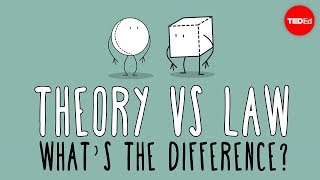(单词翻译:单击)
Chat with a friend about an established scientific theory and she might reply, 'Well, that's just a theory.'
和朋友聊天,谈及已有的科学理论,她可能会说:“算了,那只不过是一个理论啦。”
But a conversation about an established scientific law rarely ends with, 'Well, that's just a law.'
但是谈论已有的科学定律时,很少有人会说:“算了,那只不过是个定律啦。”
Why is that? What is the difference between a theory and a law, and is one better?
为什么会这样?理论和定律有什么区别?哪个更好?
Scientific laws and theories have different jobs to do.
科学定律和理论有不同的分工。
A scientific law predicts the results of certain initial conditions.
科学定律可以预测在特定初始情况下可能出现的结果。
It might predict your unborn child's possible hair colors,
它可以预测你未降生的孩子头发颜色,
or how far a baseball travels when launched at a certain angle.
或者特定角度扔出的棒球会跑多远。
In contrast, a theory tries to provide the most logical explanation about why things happen as they do.
相反,理论只会从最符合逻辑的角度解释为什么事情会这样。
A theory might invoke dominant and recessive genes to explain how brown-haired parents ended up with a red-headed child,
一个理论可能会引入显性和隐性基因来解释为什么棕色头发的父母会生出红色头发的小孩,
or use gravity to shed light on the parabolic trajectory of a baseball.
或者运用重力来阐释棒球的抛物线轨迹。
In simplest terms, a law predicts what happens while a theory proposes why.
简单来说,定律预测会发生什么,而理论解释为什么。
A theory will never grow up into a law, though the development of one often triggers progress on the other.
尽管定律和理论互相促进,一个理论永远不会演变成定律。
In the 17th century, Johannes Kepler theorized cosmic musical harmonies to explain the nature of planetary orbits.
在17世纪,约翰尼斯·开普勒用宇宙周期理论化来解释行星轨道的本质。
He developed three brilliant laws of planetary motion
他提出了三个才华横溢的天体运行定律,
while he was studying decades of precise astronomical data in an effort to find support for his theory.
潜心研究几十年精确的天文数据,来找出天体运行的规律。
While his three laws are still in use today, gravity replaced his theory of harmonics to explain the planets' motions.
虽然他的三个定律至今仍被使用,但是万有引力定律已经取代了他提出的周期定律来解释天体运动。
How did Kepler get part of it wrong?
开普勒怎么可能弄错了一部分呢?
Well, we weren't handed a universal instruction manual.
嗨,宇宙又没有给我们一本说明书。
Instead, we continually propose, challenge, revise, or even replace our scientific ideas as a work in progress.
事实上,我们一直在不断地提出新想法,不断的质疑、修改、甚至取代现有的科学理论。
Laws usually resist change since they wouldn't have been adopted if they didn't fit the data,
定律一般来说不会被改变,因为他们不会因为与数据不符而被遗弃,
though we occasionally revise laws in the face of new unexpected information.
虽然我们有时会就新的不可预测的信息将其进行修改。
A theory's acceptance, however, is often gladiatorial.
与其相反,接受一个理论常常需要一场争斗。
Multiple theories may compete to supply the best explanation of a new scientific discovery.
为了最好的诠释一个新的科学发现,不同理论可能会相互竞争。
Upon further research, scientists tend to favor the theory that can explain most of the data,
在进一步研究前,科学家会更倾向于选择一个可以解释最多现有发现的理论,
though there may still be gaps in our understanding.
即使还有很多问题我们并不明白。

Scientists also like when a new theory successfully predicts previously unobserved phenomena,
科学家们还喜欢一个可以成功预测以前没有观察到现象的新理论,
like when Dmitri Mendeleev's theory about the periodic table predicted several undiscovered elements.
就像门捷列夫的元素周期表预测了很多还未被发现的元素的性质。
The term scientific theory covers a broad swath.
科学理论这个概念其实覆盖面很广。
Some theories are new ideas with little experimental evidence that scientists eye with suspicion, or even ridicule.
一些理论只是鲜有实验数据支持的新想法,科学家们眼带怀疑,甚至嗤之以鼻。
Other theories, like those involving the Big Bang, evolution, and climate change,
其他理论,比如大爆炸理论,进化论和气候变化等等,
have endured years of experimental confirmation before earning acceptance by the majority of the scientific community.
都是经历了多年的实验证实才被科学大众所接受。
You would need to learn more about a specific explanation before you'd know how well scientists perceive it.
在学习一个特定理论之前,你要知道有科学家到底怎样看待它。
The word theory alone doesn't tell you.
因为理论这个词本身并不能告诉你什么。
In full disclosure, the scientific community has bet on the wrong horse before:
总而言之,科学家们不是没有做出过错误的判断:
alchemy, the geocentric model, spontaneous generation,
炼金术,地心说,无生源说,
and the interstellar aether are just a few of many theories discarded in favor of better ones.
还有星际以太,这些只是被正确理论抛弃的众多理论中的一小部分。
But even incorrect theories have their value.
但是即使错误理论也有他们的价值。
Discredited alchemy was the birthplace of modern chemistry,
靠不住的炼金术是现代化学的发源地,
and medicine made great strides long before we understood the roles of bacteria and viruses.
而在我们理解细菌和病毒的作用之前,医学也取得了长足的进步。
That said, better theories often lead to exciting new discoveries that were unimaginable under the old way of thinking.
由此说来,更好的理论往往会带来前人无法想象的令人兴奋的新发现。
Nor should we assume all of our current scientific theories will stand the test of time.
但是我们也不应该假定所有的科学理论都会经得起时间的考验。
A single unexpected result is enough to challenge the status quo.
一个意想不到的结果就足够挑战了。
However, vulnerability to some potentially better explanation doesn't weaken a current scientific theory.
然而,科学理论不会因为存在潜在的更好解释而衰弱。
Instead, it shields science from becoming unchallenged dogma.
正好相反,不断创新让科学免于固步自封。
A good scientific law is a finely-tuned machine,
一个好的科学定律像一个好机器,
accomplishing its task brilliantly but ignorant of why it works as well as it does.
能够出色的完成任务,但是我们对于它为何可以这样好的工作知之甚少。
A good scientific theory is a bruised,
一个好的科学理论像一个伤痕累累,
but unbowed, fighter who risks defeat if unable to overpower or adapt to the next challenger.
却依旧站立的斗士,只有不能适应或者打败下一个,挑战者才会俯首认输。
Though different, science needs both laws and theories to understand the whole picture.
即使定律和定律两者不同,科学家仍然需要两者去掌控全局。
So next time someone comments that it's just a theory,
所以下次有人说那只是一个理论的时候,
challenge them to go nine rounds with the champ and see if they can do any better.
你可以让他们和冠军比九轮,看看他们谁能赢。


